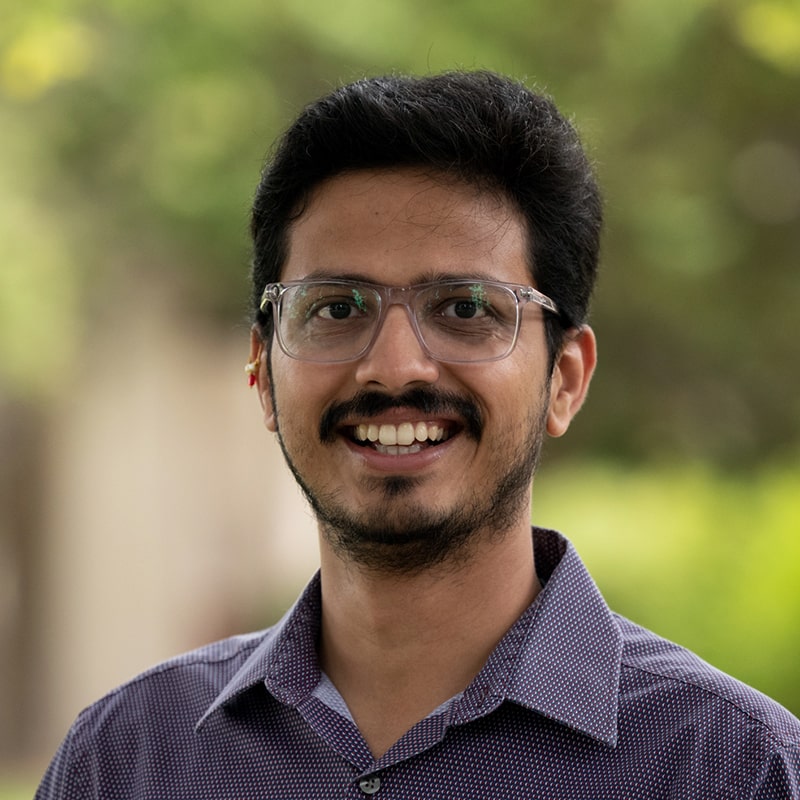Graduate Student Research Aids Pandemic Preparedness in Pune
By Stacy Kish
Abhishek Dedhe, a cognitive neuroscience Ph.D. student at Carnegie Mellon University’s Department of Psychology, uses behavioral and computational methods to investigate the mental processes needed for complex pattern learning in human adults across cultures, children, monkeys and crows. During his time at CMU, he stepped outside his area of focus to lead a multi-institutional study that examined deaths missed during the COVID-19 pandemic in his hometown — Pune, India. The results of the study were published in the May issue of the journal Scientific Reports.
Dedhe credits his advisor, Jessica Cantlon, the Ronald J. and Mary Ann Zdrojkowski Professor of Developmental Neuroscience/Psychology, for allowing him to complement his doctoral studies and research in the Kid Neuro Lab to follow this line of inquiry.
“My advisor has been exceptionally supportive about this project because it is not part of my primary Ph.D.,” said Dedhe. “It is completely unrelated and is volunteer-driven.”
Underestimating COVID-related Deaths Common
In March 2020, Dedhe and five friends participated in a hack-a-thon, sponsored by Johns Hopkins University’s Center for Bioengineering Innovation and Design, to address the multitude of challenges arising from the pandemic. This got Dedhe thinking. He was curious how Pune, the eighth largest city in India, was meeting the specific challenge of accurately recording COVID-19-related deaths.
“This is a matter of equity, specifically health equity. Not all systems around the world can afford sophisticated data systems and skilled data analysts,” said Aakash Chowkase, a post-doctoral fellow at the University of California, Berkeley and contributing author on the study. “Finding a way to obtain similar estimates using frugal methods, such as the wisdom of crowds, could save thousands of lives in resource-constrained settings.”
Dedhe assembled a team of volunteers and coordinated with Jnana Prabodhini Foundation, a non-profit based in California, to evaluate data gathered by the Pune Knowledge Cluster (PKC), a Science and Technology Cluster established by the Office of the Principal Scientific Adviser to the Government of India, which worked with local municipalities to gather daily data for COVID-19-related hospitalization, recovery and death. The team used three methods to estimate excess COVID-19-related deaths in Pune from March 2020 to December 2021.
“During the pandemic, [the Pune Knowledge Cluster] served as a knowledge partner for local municipal bodies to help them with data-driven decision making,” said Priya Nagaraj, CEO of the Pune Knowledge Cluster. “We wanted to ensure that the data could be made open-source and used for furthering understanding of the disease at the city level.”
In essence, the team evaluated the number of deaths that would normally occur in the city and calculated the number of deaths that exceeded this number between March 2020 to December 2021. They identified 14,770 excess COVID-related deaths in this region and believe the jurisdiction missed 60% of the deaths associated with the pandemic.
“There were a host of reasons why COVID-19-related deaths were missed,” said Dedhe. “They include a lack of widespread testing, absence of medical certification, deaths occurring outside formal healthcare systems and other indirect pandemic-related deaths that occurred due to delays or lack of access to healthcare, reduced hospital capacity, increased risk of other diseases and post-COVID-19 complications”
Learning from the Pandemic
“Every life is precious, and we should do everything in our power to save it,” said Chowkase, who is also the co-founder of the Jnana Prabodhini Foundation. “With the likelihood of future pandemics, understanding the actual number of deaths during COVID-19 can help prepare medical facilities for future crises, including necessary beds, equipment, staff and budgets.”
Dedhe stated that Pune’s response to the pandemic was comparable to other healthcare systems around the world, but he believes the ability to accurately record deaths is a civic responsibility. Having access to accurate and timely data builds robust data cultures that can benefit public health systems.
Nagaraj concurs. Accurate mortality data during a health crisis is crucial for effective management, equitable resource distribution, informed policymaking and long-term community resilience. These efforts can strengthen targeted public health interventions, such as lockdowns, vaccination drives, the identification of infection hotspots and the emergence of new variants. In addition, this information can help cities improve their preparations for future health crises, refine emergency protocols and improve overall resilience.
“When planning for resources, it is helpful to keep in mind that what you are actually measuring at the time of the crisis is going to be an underestimate” said Dedhe. “For Pune, the upper limit of the measured confidence interval was 2.2, so we would recommend the city prepare for twice as many cases and deaths to spend that amount in resources.”
Chowkase and Dedhe noted that this project was accomplished with the help of over 40 volunteers and researchers from five countries — India, the United States, the United Kingdom, Germany and Canada. The team included experts across academic, government and healthcare fields who came together to address a critical societal issue. Local grassroots organizations in Pune played a crucial role in distributing the study’s survey among low-income groups and urban slum residents.
CMU: An Interdisciplinary University for Personal and Professional Growth
Research comes naturally to Dedhe. He joined the graduate program in the Dietrich College of Humanities and Social Sciences after completing two science degrees at the University of Rochester. He is leveraging his double degree in computational biology and cognitive science to study how people learn and process abstract patterns needed for language, math and problem-solving.
“CMU has one of the best cognitive science programs in the country,” said Dedhe. “I liked Pittsburgh and the flexibility of the program where you can take courses from different colleges at the university as well as from University of Pittsburgh.”
Dedhe’s graduate work involves taking coursework and attending seminars through CMU and Pitt’s Center for the Neural Basis of Cognition. Dedhe is also completing a certificate in quantitative methodology by taking courses in machine learning and statistics to augment his studies in the doctoral program.
“At many institutions, ‘interdisciplinary’ is a buzzword and often used for branding, but at CMU when you say interdisciplinary you actually mean it,” said Dedhe. “At CMU you get the best of both worlds — you can focus on the hardcore fundamental research — at the same time this work does not stay in the ivory tower of research but translates into the real world.”
Dedhe was joined by colleagues, including Kody Manke, associate professor of Psychology and director of Research on Diversity, Equity and Inclusion from CMU’s Department of Psychology and Center for the Neural Basis of Cognition, the JPF Analytics, Jnana Prabodhini Foundation, University of California - Berkeley, Texas Tech University, University Hospital Würzburg, California Institute of Technology, University of Washington, University of Illinois, Chicago, University of Nebraska Medical Center, Massachusetts Institute of Technology, Indian Institute of Science Education and Research, Pune, Indian Institute of Technology, Bombay, University of Manchester, University of Iowa, University of Alberta and University of California - Davis on the study titled, “Conventional and frugal methods of estimating COVID-19-related excess deaths and undercount factors.”


